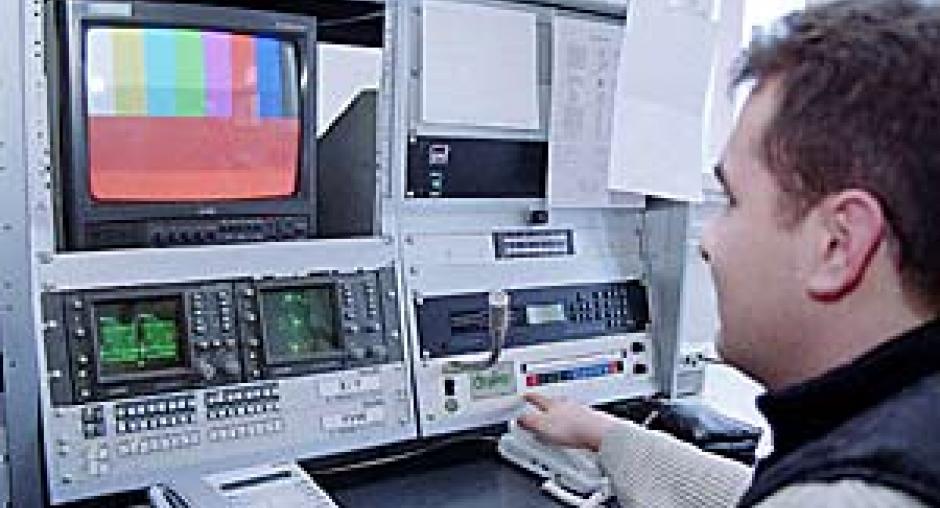Reforming Radio Television Serbia
When the OSCE started its Mission to the Federal Republic of Yugoslavia in early 2001, restructuring the country's media landscape was one of its core tasks. The biggest challenge has been to transform Radio Television of Serbia, the main propaganda tool of the former regime, into a public broadcasting service.
A challenging task
When Radio Television Serbia (RTS) requested the OSCE to serve as the umbrella organization to co-ordinate all foreign assistance towards its restructuring, the Mission to the Federal Republic of Yugoslavia found an operation that was tottering on the brink of bankruptcy.
But the Mission welcomed the challenge, knowing that although professional standards were low and its technology was obsolete, RTS still played an extremely influential role in shaping public opinion in the country.
"The problems we were confronted with seemed almost insurmountable", recalls the OSCE Head of Mission, Stefano Sannino.
"With 7,000 employees, RTS was clearly over-sized. We embarked on the task in a climate of mistrust and disinterest among the RTS staff. Having worked for years in an opinionated and biased environment, employees initially appeared to resist any changes. Because of the outdated labour law, laying off employees hired by the old regime to spread its propaganda proved difficult, if not impossible."
First successes
Wasting no time, the Mission started the process of lobbying and consulting political, media and business leaders to muster support for the transformation of RTS into a public broadcasting service - clearly a lengthy and costly undertaking.
A turning point came in the summer of 2001, when the Serbian Government appointed a new Board of Governors for RTS, made up of independent professionals from various sectors of society.
The Board appointed Aleksandar Crkvenjakov, a respected television journalist, as the general director of RTS; he, in turn, nominated Bojana Lekic, another well-known television journalist, to the post of editor-in-chief. Other appointments of journalists followed, all of whom had earned their spurs in the profession.
Changing programmes
Once the new management and staff were in place, the focus turned to the main evening news programme of RTS, which continues to be the highest rated in Serbia.
RTS reporting of events in the past few months reflects a shift in its editorial policy, causing an uproar among hard-line politicians and conservative audiences, but also drawing the interest and earning the appreciation of the majority of the viewing public.
Ground-breaking broadcasts have included the BBC's explosive feature on Srebrenica, coverage of the excavation of mass graves in Serbia and the now-standard live transmission of the War Crimes Tribunal in The Hague. Perhaps the biggest coup of all was the three-minute silence observed by Channel 1, the RTS main radio station, to pay tribute to the victims of terrorism in the United States in September.
On the domestic scene, RTS coverage of the latest rift between the two major parties in the DOS government coalition has been praised as balanced, comprehensive, informative and moderate in tone.
New initiatives
On Christmas Eve, RTS crossed a watershed of ethnic and religious tolerance: for the first time ever, it broadcast a message by the Catholic Archbishop in Belgrade and carried a live coverage of the Catholic Christmas mass - two weeks before the mostly-Orthodox Serbs were to celebrate their own Christmas.
Also in December, RTS Radio 202 inaugurated an overnight programme devoted to marginalized and neglected groups. Aside from addressing the problems of visually impaired and handicapped people, the programme has featured AIDS victims, alcoholics and drug addicts. The radio station has also dealt with issues confronting homosexuals in Serbia in an effort to promote tolerance towards people who are "different".
Closer co-operation
In order to make it easier for the OSCE to work closely together with RTS's management and editorial staff, on 21 February 2002 the Mission opened an office in main building of Radio Television Serbia on Abardareva street in the centre of Belgrade.
This is especially important since an international audit of RTS, commissioned by the OSCE Mission according to European standards, is now underway. The audit, funded by the European Agency for Reconstruction, will be performed by a team of 12 international auditors of the Andersen consulting company.
The auditors involved - all of them experts with similar experience in other countries in south-eastern Europe - will diagnose the entire structure of RTS. This will include a financial review of its assets, an inventory of the technical and technological systems, as well as a strategic and operational analysis.
"Since the new RTS management is in place, changes are already visible", Mr. Sannino said. "But in order for RTS to become an economically viable and highly professional public broadcasting service, we need to know what further remedies are needed".

